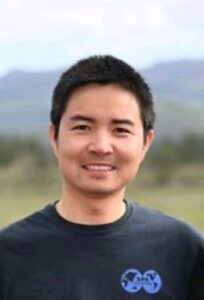
Derek Vikara
National Energy Technology Laboratory

Bailian Chen
Los Alamos National Laboratory
Seminar Information:
Date: June 7, 2023
Time: 1:00 pm – 2:00 pm MT
Location: Held via Webex. A no-cost registration is required to attend.
Register here or contact [email protected] for assistance.
The I-WEST seminar series hosts thought leaders on a spectrum of topics tied to transitioning the Intermountain West to carbon neutrality, including technologies, policy, workforce, and environmental justice.
Seminar Summary
Carbon capture, utilization, and storage (CCUS) is expected to play a critical role in energy transition and is an area of interest for the Intermountain West. With approximately 40 different CCUS projects either proposed or already in operation in the region, the Intermountain West is poised to be a leader in advancing CCUS technologies. Still, a sustainable strategy for achieving carbon neutrality must be fair and equitable, with concerted and coordinated efforts on many levels.
This seminar presents I-WEST findings from an assessment of opportunities for CCUS deployment at significant scale within the Intermountain West. It will highlight a variety of CO2 storage and utilization approaches available to the region, relevant governing regulations, and technical and non-technical grand challenges associated with each option. Additionally, the seminar will provide context to help listeners better understand the technical aspects of CCUS and how they interface with economic, social, and policy aspects of decarbonization applicable to the I-WEST geographic region.
The I-WEST assessment on regional CCUS deployment leveraged shared experiences, lessons learned, and best practices from project practitioners that have conducted or are planning to conduct CCUS operations in the Intermountain West. It also included a quantitative assessment of the region’s existing CO2 sources, geologic storage options, and potential CO2 transportation needs. Read ahead about what will be presented at this seminar in the “CO2 Storage and Utilization” chapter of the I-WEST phase one report.
Speaker Summaries
Dr. Derek Vikara is a support contractor for the National Energy Technology Laboratory (NETL) in Pittsburgh, PA with over 17 years of experience managing and conducting technical support and implementing research and development (R&D) across government, academic, and industry settings. His current work aims to advance the understanding and ability to analyze subsurface energy resources with the purpose of improving development decision-making and supporting their integration into energy systems that enable a low-carbon transition. These subsurface energy systems include geologic storage of CO2, enhanced oil recovery, unconventional oil and gas development, geothermal technologies, and produced water management. In addition, he provides guidance and consultation towards the management of DOE-funded large-scale CO2 storage demonstration projects and has led many of the NETL’s efforts in applying machine learning and advance data visualization approaches to subsurface energy applications. He received his B.S. degree in Environmental Science from Allegheny College in 2003 and his M.S. degree in Environmental Engineering from the University of Connecticut in 2005. He completed a Ph.D in Civil and Environmental Engineering at the University of Pittsburgh in 2021 focusing on applying machine learning approaches to subsurface energy applications and hydrology problems.
Dr. Bailian Chen is a research scientist at Los Alamos National Laboratory in Los Alamos, NM. His research interests include CCUS, hydrogen storage, machine learning, optimization, and data assimilation. He has published over 60 scientific journal articles/conference papers and delivered more than 40 technical presentations/invited talks at various conferences and universities. He serves as an associate editor for Geoenergy Science & Engineering and SPE Reservoir Evaluation & Engineering.


